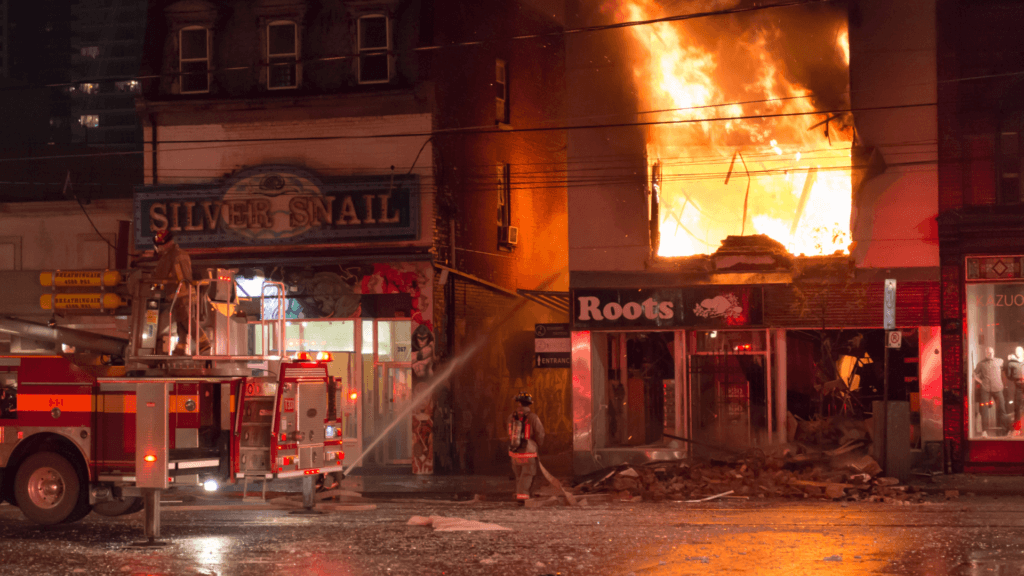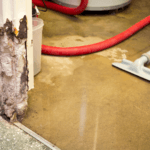
Fire damage to a business can be particularly devastating. Even if the fire doesn’t cause the structure to burn to the ground, it can leave behind long-lasting damage from smoke and soot. Not only that, but commercial property owners may also have to grapple with a loss of inventory or have to consider relocating permanently. With these and other factors in mind, having a good understanding of whether or not damage from a fire can be covered under a commercial insurance policy is incredibly important.
Coverage for Fire Damage at a Commercial Property
Fires are one of the most common causes of damage to commercial property. According to the National Fire Protection Association (NFPA), in 2021 alone fire departments across the nation responded to an estimated 1.3 million fires that caused a total of $15.9 billion in property damage.
A fire’s flames, smoke and heat can all greatly damage buildings and their contents. Not only that, but firefighting materials like water, foams, and powders can also cause further destruction to property. Recovering from such damage can be a challenge, as it is often costly and time-consuming to deal with. In certain situations, businesses can be left on the hook financially for damages to customer or client property, all while the business is left completely inoperable. A business with no insurance coverage for such damage will have to cover the cost of repairs and fire department service fees out of pocket. If the business lacks the financial resources to pay these costs, it may be forced to cease operations.
When it comes to purchasing insurance to cover fire damage, potential policyholders should know whether or not the fire is friendly or hostile. Friendly fires, for instance, refer to a fire that is ignited on purpose and remains in the area it was intended to burn, like a fireplace or stovetop. Hostile fires, however, are events that are unintended or uncontrollable, like a wildfire. Commercial property insurance can help protect businesses from hostile fire damage.
While most commercial property insurance policies cover damage caused by fire, additional coverage should also be purchased to ensure the damaged items are repaired or replaced, and that the business can stay in operation. These include:
Commercial Fire Insurance
Commercial fire insurance will cover damage to the affected structure, the property within it, and the property of clients and/or customers. Buildings included in commercial fire insurance include all of the commercial structures and/or offices the business owns. If a building is leased and the rental agreement requires fire coverage, protection can be obtained for the landlord’s property. Additionally, outdoor signage, fences, and landscaping would all be covered under this type of policy.
The contents of the property, including furniture, equipment, computers, tools, and inventory stored on or near the business, are protected under a commercial fire policy. If the business rents equipment, vendors will likely require it to be insured while it is in the business owner’s possession. Any valuable records and papers that may be destroyed in a fire are generally covered under a commercial fire policy; however, records of significant value may warrant a separate valuable papers and records policy.
General Liability Insurance
General liability insurance covers common risks to businesses, such as third-party injuries that may occur on the property, certain property damage, and defamation lawsuits. Concerning commercial fire claims, liability coverage would cover the costs associated with any client or customer property that is damaged or destroyed. General liability policies can also cover the treatment costs for certain injuries sustained due to a fire at the business.
Commercial Auto Insurance
If a business has company-owned vehicles, they are required by law to carry commercial auto insurance. These policies cover the costs of any related injuries or property damage should an accident happen – including damage from fires.
Comprehensive commercial auto coverage also covers damage to company vehicles due to vandalism, burglary, or water damage. For example, if a fire broke out at a carpet cleaning business and the garage where the work vans are kept was compromised, comprehensive commercial auto coverage would cover the cost of the damaged vehicles.
Business Interruption Insurance
Business interruption insurance can be purchased as a rider or endorsement to a commercial property policy. This coverage kicks in if a business must close temporarily due to an unexpected event, like a fire. Business interruption insurance covers the expenses associated with running the business and other operating expenses that still must be paid while the property is inoperable, including:
- Rent payments
- Employee salaries
- Relocation costs
- Loss of business income
- Debt payments
Smoke Damage
When a fire breaks out at any type of property, the resulting smoke from it can quickly become a cause for concern, just as much as the fire’s flames. Smoke from any type of fire is made up of carbon monoxide, carbon dioxide, and soot. Depending on what is actually burning, other harmful chemicals can enter the air, be inhaled into the lungs, or latch onto walls, furniture, clothing, ductwork, and other items. The degree of devastation caused by smoke damage will depend on the temperature, surrounding environment, and particle ionization.
For instance, as hot air rises, smoke damage will most often be concentrated above where the fire burned, as strong air currents flowing through the building push the smoke residue toward the ceiling and above the fire. The outside walls and windows can also be affected, as well as ductwork and door openings.
Because colder air sinks below warmer air, this opens a path for the smoke to travel to other areas of a commercial property. Even if the fire is concentrated in the center of one room, it’s common to find smoke residue on outside walls, windows, door openings, and ductwork.
Businesses and office buildings typically contain furniture, electronics, décor, and other items that will be damaged by smoke if a fire occurs. Smoke damage can affect certain spaces that are seemingly enclosed like desk drawers, closets, and other spaces. These areas can have more smoke damage than areas that were directly burned or melted by the fire.
Smoke Particle Ionization
Typically, smoke particles are ionized and possess electrical charges that attract them to certain surfaces. This can cause smoke damage such as:
- Nail heads in the ceiling: Metal nail heads can magnetically attract ionized smoke particles to land in a ring around them.
- Corners of the room or building: When plastics burn, the smoke carries a stronger charge than that of wood, cotton, or paper. This charge causes smoke residue to collect in “webs” where the walls and ceiling come together.
- On synthetic materials: Manmade furnishings – like vinyl products – tend to have greater ionization characteristics that attract smoke particles at such high concentrations that they become permanently stained.
Filing a Commercial Fire Damage Insurance Claim
No matter the type of business, fires have the potential to break out at any time. Whether it’s a grease fire at a restaurant or an electrical fire at a tech company, a blaze on the premises of a company can quickly cause operations to shut down for some time or even permanently depending on the severity. Because of the various risks that come with fire, it’s imperative that business owners obtain proper insurance coverage for these events with a commercial property policy under which they can file a claim to cover the resulting damages.
Once a commercial property claim for fire damage is filed, the insurer will likely send the insured a proof of loss form or send a claims adjuster out to review the damage. After the adjuster surveys the fire damage, they will send their findings back to the insurance company to determine the outcome of the claim. Unfortunately, in these situations, insurers can choose to delay, undervalue, or completely deny valid claims for fire damage. While this can understandably be frustrating for business owners, taking care of certain items during the initial claim filing can help policyholders better ensure their claim is properly investigated in order to obtain the funds necessary for the repair or replacement of property.
Things to consider when filing a commercial fire damage insurance claim include:
Reviewing and Understanding the Full Extent of Commercial Coverage
Business owners should review their existing commercial property coverage well before a fire occurs. While most commercial policies cover fire damage to the building, its contents, and the property of others in the business’s care, each policyholder’s coverage can vary depending on the terms of the insurance policy. Though most commercial plans will cover direct fire damage, policy endorsements can add further coverage for perils incidentally related to fire, such as fire department fees or damage from falling objects.
Ensuring a business has sufficient coverage before a potential fire begins can help give owners the peace of mind that their investment will be well protected from fire damage. Not only that, but having a good understanding of the overall policy coverage can give policyholders an upper hand should an insurer attempt to wrongly delay or undervalue a claim.
Maintaining Documents and Receipts
After an insurance claim has been filed, policyholders will need to provide their insurers with as much information as possible about the property before and after the loss occurred. While many policyholders are aware of the need to submit photos and videos of the damage, they may not know that it can be incredibly beneficial to also submit thorough documentation of the building’s condition beforehand, as well as to maintain all necessary documents and receipts for all items the business owns. The insured should also not throw away any damaged property until after the claim has been processed, as this can impact the outcome of the claim.
Business owners should collect any relevant records they may need to prove the value of their property, damaged equipment, inventory, and/or any other structures that may be included in a claim. The same also applies when seeking to obtain business interruption coverage after fire damage has occurred. Businesses will need to provide proof to their insurer of income in the amount the company generated before the event and the amount the company is able to generate after the event. This can include financial documents such as tax returns, monthly sales, business contracts, budgets, financial statements, and other items.
Monitoring the Progress of an Insurance Claim
While it can be tempting to hand everything off to the insurance company and hope the claim will be processed in a thoughtful and timely manner, this often doesn’t happen. Insurance providers can cause major delays in claim processing in the hopes the insured will simply give up on the claim altogether. By monitoring the progress of a fire damage claim, business owners can make a big difference in ensuring a claim is resolved promptly.
Keeping detailed records together and planning to regularly contact the insurance company to check on the progress of a claim can help with a claim’s progress. It can also be helpful to consult with legal counsel regarding how to proceed if it appears the insurance company is slow to act on the claim.
Under the Texas Prompt Payment of Claims Act (TPPCA), insurers must undertake prompt investigations and payments of insurance claims. Under the Act, all insurers must pay claims within 60 days of receiving all necessary items, forms, and statements. If a carrier is found to have acted contrary to its legal obligations, it must pay interest and attorney’s fees in addition to the amount of the claim. To recover these fees, a policyholder must prove they have a valid claim under their policy, the insurer is liable for the claim, and the insurer failed to comply with the TPPCA’s requirements.
Mitigating Further Damage
Each property insurance policy requires the policyholder to take reasonable steps to minimize further damage to the property after a covered event occurs. The insurance company will pay the costs associated with mitigating the damage, but only with proof of the damaged property and items submitted before taking action.
One of the ways commercial policyholders can mitigate further fire damage is by stopping any ongoing smoldering. After a fire, if the structure is still burning, property owners should contact the fire department to investigate and stop further burning of the property to prevent a flareup. The property should also be boarded up or covered with a tarp to protect it from others and outside elements.
Reporting Any Vandalism to Police
Unfortunately, fire-damaged properties often become targets for vandalism. When a property is left inoperable for a period, it may appear abandoned – leading others to potentially inflict further damage and/or steal items from the property. As soon as a commercial property owner suspects something has been stolen or the property has been vandalized, they should contact the police as well as the insurance company.
Denied Commercial Fire Damage Claims in Texas
The overall impact of dealing with fire-related damage can be compounded for commercial property owners if an insurance claim is denied. Insurance claim denials relating to fire damage can occur due to minor errors during the claim investigation process. Insurance providers can also be quick to deny claims relating to fire damage due to speculations of fraud or arson; and, there are many more reasons why commercial fire damage claims are denied, including:
Insufficient Coverage
One of the most common reasons fire damage claims are denied is insufficient coverage. While most commercial property policies do cover fire damage, in some cases they may only cover a portion of the damages. Policies may only cover damage directly caused by flames and not damage due to smoke or water damage from fire sprinklers, for instance.
To avoid an insurance company denying a fire damage claim due to insufficient coverage, commercial property owners must take the time to review their policy for any coverage gaps. In doing this, they can ensure they have the proper coverage in place to obtain the necessary compensation in the event of a fire damage claim.
Suspected Fraud
Suspected fraud or arson are two other common reasons insurance companies deny fire claims. In these cases, insurance companies may attempt to prove the insured intentionally set fire to the business to make an insurance claim. This is an incredibly frustrating method insurance carriers use to avoid paying out on claims; however, an insurer cannot deny a claim due to speculation or suspicion the fire was started fraudulently by arson. In these instances, the insurer may use different language about the suspected fraud, such as:
- The fire department was unable to determine the source of the fire;
- The insurer believes the policyholder or someone else committed arson to defraud the insurer; or
- The policyholder is lying or hiding details about some aspect of the fire damage claim.
Misrepresentation of the Claim
Insurance companies frequently deny fire damage claims due to misrepresentation of the claim or the cause of the fire. In these situations, it is implied that the insured lied or misrepresented the facts of the claim to the insurer, giving the carrier cause for denial. While it is important to always be upfront and honest with an insurer when it comes to filing a claim, a carrier could be found to have acted in bad faith if it is ultimately determined that the policyholder did not misrepresent the facts of the claim.
Not Taking Preventative Measures
All commercial policyholders are expected to take reasonable measures to limit loss or damage to the business. When this doesn’t happen, it can be grounds for a claim denial. For instance, if an employee accidentally started a fire in a business’s break room due to old, faulty electrical equipment, the insurer might deny the claim as the equipment hadn’t been updated or replaced. By ensuring a business is in tip-top shape and not exposed to any hazards that could result in a fire, policyholders can help prevent the frustration of a claim denial.
Commercial Property Insurance Claim Attorneys
Fires – and the resulting damage – can lead to the total loss of a business; and, often the aftermath is as emotionally and financially challenging as the event itself. The loss of a business to a fire can present great hardship and challenges. While owners may find solace in having the right insurance policy in place, their insurers can still choose to take advantage of them during this traumatic time.
Policyholders have rights that must be honored. At Raizner Slania, our commercial fire damage insurance coverage attorneys are aware of the tactics carriers use to avoid paying the insured what they are owed, and we will fight for what is rightfully due. If you need assistance with a commercial fire damage claim, we can help.


